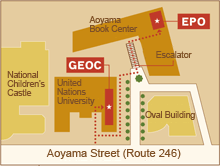Overview
Life studio was established by three housewives with 100,00 yen investment each in October 2000 with the aim to create an enduring community which harmoniously coexists with the environment and value the connection and reciprocity between people. It turned to NPO association in 2010.
Life studio publishes a mini communication paper “Ogawamachi Map”, through which they introduce information from several angles such as ecology and gender equality as a guide for people to enjoy town life in Ogawamachi. Ogawamachi is a town located 70 minutes by train from Tokyo and with a population of 30,000. Thanks to its small size, its residents can easily have a sense of “our town”. (“Ogawamachi Map” is distributed as an insert in the newspaper Ogawamachi quarterly). Information is also accessible via their website (http://tubasa-u.com/index.html ) or by mail magazine.
Life studio aims to establish a self-sufficient local production for local consumption model town for “food” basically made by organic farming and “energy”. Their goal is to create a mutual assistance civil face-to-face network for the residents.
The NPO makes contracts with organic farmers in Ogawamachi, Saitama and mediates CSA (Community Supported Agriculture) activities so that local citizens and companies support organic farmers while protecting the environment. It also mediates projects engaged in forests, rivers and rice farming through Satoyama conservation activities.
Since 2010 the NPO has held a personnel-training course to better manage agricultural resources and train coordinators. They have been making efforts to nurture personnel who can manage and coordinate while analyzing and using regional viewpoints especially from the agricultural angle.
Additionaly, Life studio plans and manages various other projects. For example, -“Beri Café”, a restaurant where chefs cook on day-by-day rotating basis, -Cooperation of organic farmers and citizens of Ogawamachi (Shimosato farm),
-“Ogawamachi croquette”, a cooperative project with Fujiya meat store, and -“Pikkari Tofu”, a product development project between a local organic farmer and a local Tofu shop.
-Garbage recycling (biogas), a project supported by citizens’ investment
-Kids environmental staff dispatching project and
-“Tanabata (The Star Festival) project leading towards the 30th century” using handmade Japanese paper without rubbish.
Points about the partnership
They develop their activities while they establish relationships with a variety people. Ms. Yuko Takahashi, the representative, plays a central role.
They spent several years to mediate between farmers and urban residents and established connections to ensure that urban residents can understand the difference between time and value in rural areas.
They applied for AP (Artists’ Power/Alternative Power) bank funds and gained its approval and access to funding for their activities.
They also established a system to raise fund from citizens who wish to invest business to protect the local environment.
Category
Based on efforts at ‘co-action’ (cooperative action) by diverse actors
Theme
Sustainable regional construction
Actors
NPO Association / Life Studio “Tsubasa-U”
Partners
Volunteers from local companies, urban residents, citizen and pro bono
Relevant website
Tsunakan 17th issue “Let’s make a community for continuous safety life” /information/tsunakan/index/tsuna17
Ogawamachi Map http://tubasa-u.com/index.html
Twitter https://twitter.com/#i/tubasau

















